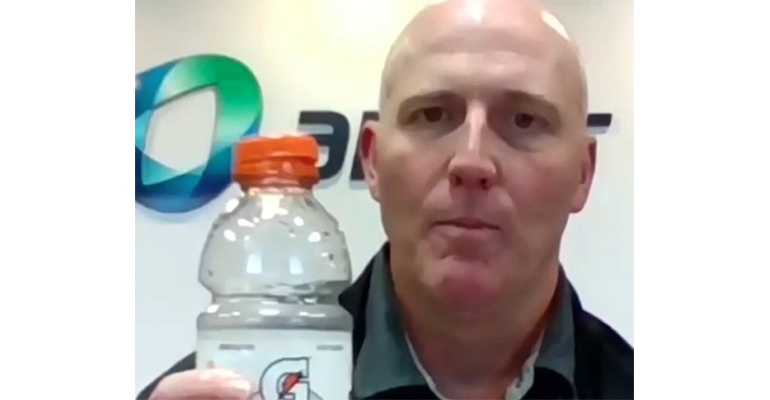
Aluminum Industry Veteran Makes Compelling Case for Sustainability of Plastics

Sounding an optimistic rallying cry, Amcor’s Eric Roegner asserted today that the plastics industry has a clear advantage in turning the tide of public perception in its favor by aligning behind a simple fact: Plastic packaging, especially the PET bottle, is the most sustainable option vis-à-vis aluminum cans and glass bottles.
President of Amcor’s $3 billion rigid packaging division, Roegner made that case in his opening keynote address, “Break Glass. Crush Aluminum. The Future of Plastic Packaging,” during the inaugural PLASTICS Packaging Summit, a three-day virtual event on Nov. 3 to 5.
The key is to make clear to the public that while the packaging industry loves plastic, it hates plastic waste and fully embraces maximum recyclability. “We’ve got to work with the market,” he said. “We have to educate. We have to create an environment where people can recycle” by removing obstacles to collecting plastic packaging to turn into post-consumer resin (PCR). The United States is so lacking in PCR to meet current and long-term packaging commitments, he added, that it must be imported from Taiwan or Latin America.
Compared with the greenhouse gas footprint of aluminum and glass, Roegner explained, plastic packaging holds the distinct advantage in recyclability. Aligning behind that message — and ultimately making consumers feel good about using plastic bottles by educating them about the science behind that advantage — is imperative for the plastics industry’s leadership.
He clearly knows whence he speaks. Being a 12-year veteran of the aluminum industry, Roegner detailed how that industry overcame reputational issues by crafting a clear, compelling message and repeating it consistently to legislators and policy makers. And the plastics industry has an even more fundamentally sound message, he asserted.
“The reason I came to work at Amcor and the reason why I’m in this business is because this package is the most sustainable package on Earth, and I actually want to make a difference and help the environment,” he said.
Noting how the COVID-19 pandemic proved a boon to the plastics industry, whose products ensured the safety not only of healthcare workers and first responders but also consumers who increasingly opted for takeout or delivery food, “we have to get more engaged in the fight … the fact is, facts are on our side.”
For instance, making or recycling aluminum or glass requires heating at intense temperatures, and those cans cannot be made completely from recycled material, he noted. By contrast, mechanically processing PET into PCR can be done at low cost and low energy.
“We are in a fight,” he said bluntly. “If we don’t figure this out, [negative] perception will become reality.” Because a plastic bottle is highly portable and, therefore, highly visible when disposed of improperly along roadways, in waterways or on beaches, “it makes for a very easy target.”
That said, Roegner is confident that robust investment in circular economy infrastructure coupled with vigorous communication and engagement can win the hearts and minds of consumers. Even discoloration that might be visible in a bottle made of repeatedly recycled material can be used as a marketing point for credibility, he added. “We’ve got to be proud of our package.”
Noting how the aluminum industry improved its image 25 years ago with its Cradle to Cradle certification, Roegner said the plastics industry has even more upside, and its brand owners are particularly motivated to find solutions.
“This package,” he said, holding up a drink bottle, “is the only package that can be made out of one hundred percent recycled material (and) can be one hundred percent recycled. We can do that infinitely — and we will win this fight.”

Leave a Reply